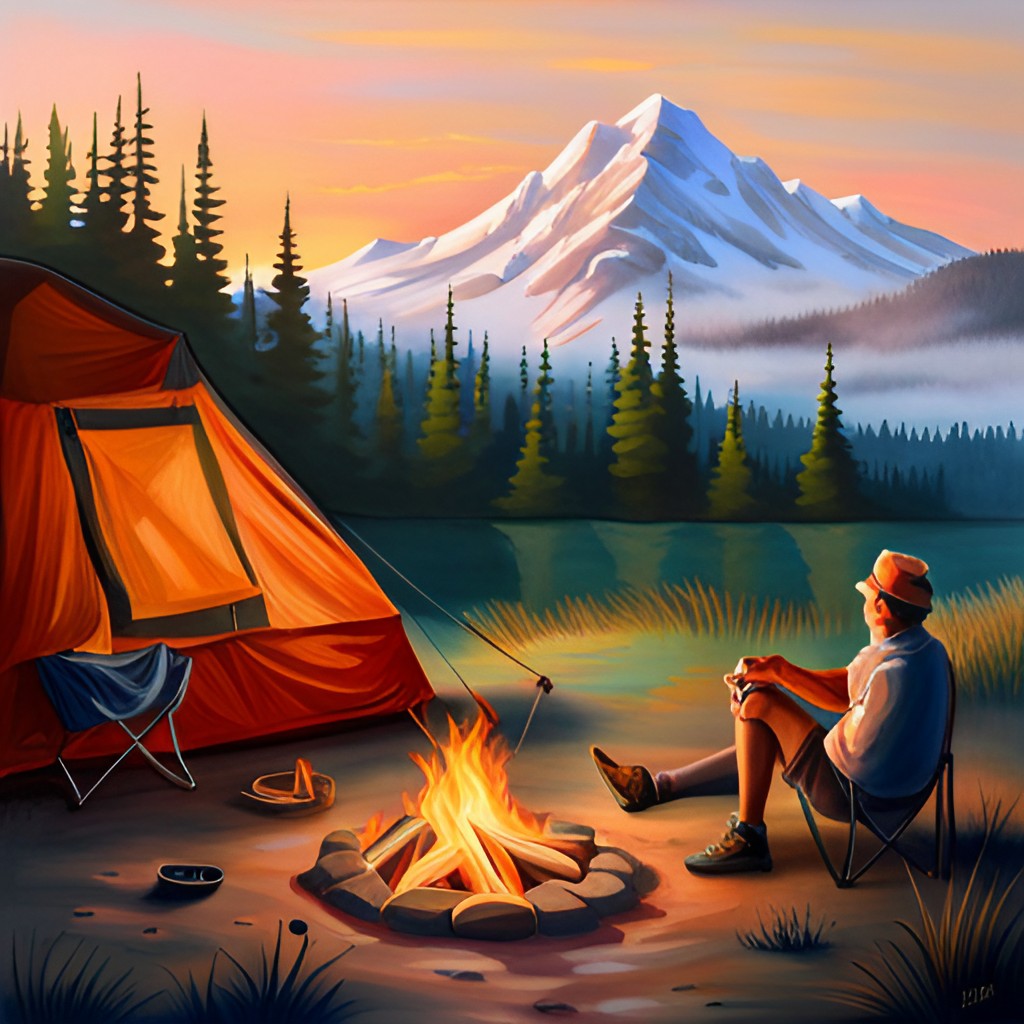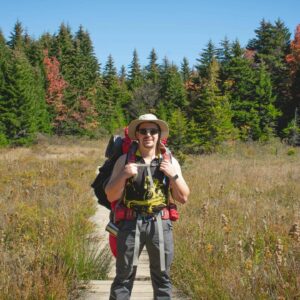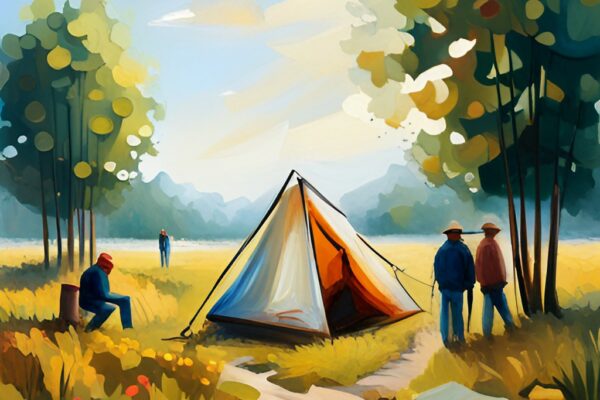
Embarking on a tent camping trip can be an exciting and rewarding adventure for seniors. It offers a chance to connect with nature, enjoy outdoor activities, and create cherished memories. However, to ensure a safe and comfortable experience, seniors need to consider specific key considerations and make necessary preparations.
From planning the trip to managing medications and overcoming potential challenges, this guide provides valuable insights and practical tips tailored to the needs of seniors. Whether you are a seasoned camper or new to the world of outdoor adventures, this resource aims to help seniors make the most of their tent camping experience while prioritizing their well-being and enjoyment.
Additionally, we address frequently asked questions and provide information on camping suitability, age restrictions, and camping groups dedicated to seniors. Let’s delve into tent camping and discover how seniors can make their outdoor journeys safe and enjoyable.
- What Are the Key Considerations for Seniors When Planning a Tent Camping Trip?
- Why Is Tent Camping Beneficial for Seniors in Physical and Mental Well-Being Terms?
- How Can Seniors Ensure a Safe Camping Experience While Tent Camping?
- How Can Seniors Maintain a Comfortable Sleeping Arrangement While Camping in a Tent?
- What Essential Items and Equipment Should Seniors Pack for a Comfortable Tent Camping Experience?
- What Are the Recommended Physical Activities and Exercises for Seniors to Stay Active and Fit During a Tent Camping Trip?
- How Can Seniors Manage and Store Their Medications Safely While Tent Camping?
- When Is the Best Time of Year for Seniors to Go Tent Camping?
- What Are the Potential Challenges Seniors May Face While Tent Camping, and How Can They Overcome Them?
- When Should Seniors Consider Seeking Assistance or Medical Help While Camping in a Tent?
- Tent Camping for Seniors: Tips for a Safe and Comfortable Experience – Frequently Asked Questions
- Tent Camping for Seniors: Tips for a Safe and Comfortable Experience – Conclusion
- Tent Camping for Seniors: Tips for a Safe and Comfortable Experience – Recommended Reading
What Are the Key Considerations for Seniors When Planning a Tent Camping Trip?
When planning a tent camping trip, seniors must consider certain key considerations to ensure a safe and enjoyable experience. Here are some critical factors for seniors to keep in mind:
1. Health and Fitness Levels – Considerations for Seniors When Planning a Tent Camping Trip
Seniors should assess their health and fitness levels before embarking on a tent camping trip. It’s advisable to consult with a healthcare professional to ensure they are physically capable of handling camping demands.
2. Accessibility of Campgrounds – Considerations for Seniors When Planning a Tent Camping Trip
When choosing a campground, seniors should prioritize accessibility. Look for campsites with level terrain, paved pathways, and accessible restroom facilities. This will make it easier for seniors to navigate the campground and reduce the risk of falls or injuries.
3. Campsite Location – Considerations for Seniors When Planning a Tent Camping Trip
Consider the campsite’s proximity to medical facilities and amenities such as grocery stores, pharmacies, and hospitals. This ensures that seniors can easily access necessary medical assistance or supplies during their trip.
4. Tent Selection – Considerations for Seniors When Planning a Tent Camping Trip
Opt for a tent that is easy to set up and provides sufficient space for seniors to move around comfortably. Look for tents with large doors and vestibules for easy entry and storage of camping gear. Choose a tent with good ventilation to ensure proper airflow and reduce condensation.
5. Sleeping Arrangements – Considerations for Seniors When Planning a Tent Camping Trip
Seniors should prioritize comfort when it comes to sleeping arrangements. Invest in quality sleeping pads or air mattresses that offer adequate support and cushioning. Additionally, consider using a lightweight, compact camping pillow to ensure a good night’s sleep.
6. Weather Considerations – Considerations for Seniors When Planning a Tent Camping Trip
Seniors should pay close attention to weather forecasts and plan their camping trips accordingly. Avoid extreme weather conditions and be prepared for sudden changes in weather by packing appropriate clothing and gear. Layering clothing is recommended to adjust to varying temperatures throughout the day.
7. Medications and First Aid – Considerations for Seniors When Planning a Tent Camping Trip
Seniors should ensure they have an ample supply of their medications for the camping trip. Packaging a well-stocked first aid kit containing essential items such as bandages, antiseptic ointment, pain relievers, and any necessary personal medications is also advisable.
8. Safety Precautions – Considerations for Seniors When Planning a Tent Camping Trip
Seniors should take necessary safety precautions while camping. This includes practicing campfire safety, properly storing food to avoid attracting wildlife, and being aware of potential hazards in the camping area. Seniors should also inform a trusted person about their camping plans and itinerary for added safety.
9. Physical Activities – Considerations for Seniors When Planning a Tent Camping Trip
Physical activities can help seniors stay active and enjoy their camping experience. Choose activities suitable for individual fitness levels, such as hiking on well-marked trails or engaging in gentle stretching exercises.
10. Packing Essentials – Considerations for Seniors When Planning a Tent Camping Trip
Seniors should pack essentials that cater to their specific needs. This may include extra layers of clothing, comfortable footwear, sunscreen, insect repellent, a hat, and sunglasses. Packing lightweight camping chairs and a small portable table for comfort at the campsite is also advisable.
By considering these key factors, seniors can plan a tent camping trip that is safe, comfortable, and enjoyable. Listen to your body, pace yourself, and make adjustments to ensure a positive camping experience.
Why Is Tent Camping Beneficial for Seniors in Physical and Mental Well-Being Terms?
Tent camping can offer numerous benefits for seniors regarding physical and mental well-being. Here are some reasons why tent camping is beneficial for seniors:
1. Physical Activity – Tent Camping Benefits for Seniors
Tent camping encourages seniors to engage in physical activities such as hiking, walking, or biking. These activities provide opportunities for cardiovascular exercise, strengthening muscles, and improving flexibility. Regular physical activity promotes better overall health, helps maintain a healthy weight, and reduces the risk of chronic diseases such as heart disease and diabetes.
2. Fresh Air and Sunshine – Tent Camping Benefits for Seniors
Spending time outdoors while camping exposes seniors to fresh air and natural sunlight. Fresh air can improve lung function, boost the immune system, and enhance oxygen flow to the brain, resulting in increased alertness and overall well-being. Sunlight is a natural source of vitamin D, which is essential for bone health and can help prevent conditions like osteoporosis.
3. Stress Reduction – Tent Camping Benefits for Seniors
Camping in natural surroundings offers a break from the fast-paced and stressful environments many seniors may experience daily. The tranquility of nature, the soothing sounds of birds chirping, and the absence of urban noise can promote relaxation and reduce stress levels. Being in nature has lowered cortisol levels (the stress hormone) and elevated mood.
4. Connection with Nature – Tent Camping Benefits for Seniors
Tent camping allows seniors to reconnect with nature and appreciate its beauty. This connection has a calming and rejuvenating effect, fostering a sense of serenity and inner peace. Spending time in natural settings can also improve cognitive function and attention span.
5. Social Interaction – Tent Camping Benefits for Seniors
Camping provides opportunities for seniors to socialize and bond with family members, friends, or fellow campers. Shared activities such as cooking meals together, sitting around a campfire, or engaging in group games encourage social interaction and promote a sense of belonging and camaraderie.
6. Mental Stimulation – Tent Camping Benefits for Seniors
Tent camping stimulates the mind by offering new experiences and challenges. Seniors can explore unfamiliar terrains, learn survival skills, identify plants and wildlife, and engage in problem-solving activities such as setting up a tent or building a campfire. These mental challenges help keep the brain active and improve cognitive function.
7. Improved Sleep Quality – Tent Camping Benefits for Seniors
Camping allows seniors to reset their sleep patterns and improve the quality of their sleep. Exposure to natural light during the day and the absence of artificial light at night can help regulate the body’s natural sleep-wake cycle. Additionally, the physical exertion and fresh air experienced during camping can contribute to a more restful sleep.
8. Sense of Adventure and Achievement – Tent Camping Benefits for Seniors
Tent camping offers seniors a sense of adventure and accomplishment. Overcoming challenges such as hiking to a scenic viewpoint or successfully setting up a campsite can boost self-confidence and provide a sense of achievement. This sense of adventure and accomplishment can enhance self-esteem and overall satisfaction with life.
9. Mindfulness and Mind-Body Connection – Tent Camping Benefits for Seniors
Camping encourages seniors to be present at the moment and engage in mindfulness practices. Whether observing the beauty of a sunset, listening to the sounds of nature, or practicing deep breathing exercises, camping promotes a stronger mind-body connection and a sense of inner peace.
10. Increased Appreciation for Simple Pleasures – Tent Camping Benefits for Seniors
Tent camping allows seniors to appreciate the simple pleasures in life. From enjoying a hot cup of coffee by the campfire to marveling at a star-filled night sky, camping helps seniors cultivate gratitude and find joy in the little things.
How Can Seniors Ensure a Safe Camping Experience While Tent Camping?
Seniors can take several precautions to ensure a safe camping experience while tent camping. Here are some important considerations for seniors:
1. Research and Planning – Safe Camping Experience While Tent Camping For Seniors
Before embarking on a camping trip, seniors should thoroughly research the campground and destination. This includes checking the campground’s facilities, accessibility, and safety record. Additionally, seniors should plan their itinerary, including the duration of the trip and any activities they intend to engage in.
2. Physical Health Assessment – Safe Camping Experience While Tent Camping For Seniors
Seniors should assess their physical health and consult a healthcare professional before camping. Understanding any limitations or conditions that may affect their ability to handle camping demands is essential. This can help seniors make informed decisions and take necessary precautions.
3. Medications and Medical Supplies – Safe Camping Experience While Tent Camping For Seniors
Seniors should ensure they have an adequate supply of their medications for the camping trip. Medications should be appropriately stored and easily accessible. Carrying a first aid kit with essential supplies, such as bandages, antiseptic ointment, pain relievers, and any necessary personal medications, is also recommended.
4. Campsite Selection – Safe Camping Experience While Tent Camping For Seniors
Seniors should carefully choose their campsite to ensure safety and convenience. Look for well-maintained campgrounds with level terrain, accessible paths, and nearby restroom facilities. It’s also important to consider the campsite’s proximity to medical facilities and emergency amenities.
5. Weather Conditions – Safe Camping Experience While Tent Camping For Seniors
Seniors should stay updated on weather forecasts and plan their camping trips accordingly. Extreme weather conditions, such as heatwaves, storms, or freezing temperatures, can threaten seniors’ health and safety. Seniors should pack appropriate clothing, gear, and equipment to handle varying weather conditions.
6. Camping Gear and Equipment – Safe Camping Experience While Tent Camping For Seniors
Seniors should choose camping gear and equipment suitable for their physical abilities. Opt for lightweight and easy-to-handle gear, such as tents, sleeping bags, and camping chairs. It’s also essential to ensure that equipment is in good working condition to prevent accidents or malfunctions.
7. Campfire Safety – Safe Camping Experience While Tent Camping For Seniors
Seniors should follow proper campfire safety guidelines. This includes keeping a safe distance from the fire, never leaving the fire unattended, and fully extinguishing the fire before leaving the campsite or going to bed. Seniors should also be cautious when handling fire-related equipment and follow any campground regulations or restrictions regarding campfires.
8. Hydration and Nutrition – Safe Camping Experience While Tent Camping For Seniors
Seniors should prioritize hydration and proper nutrition while camping. Drinking plenty of water and consuming a balanced diet is vital to maintain energy levels and prevent dehydration. Seniors should pack and store food safely to avoid contamination and foodborne illnesses.
9. Mobility and Fall Prevention – Safe Camping Experience While Tent Camping For Seniors
Seniors should be mindful of their mobility and take precautions to prevent falls and injuries. This includes wearing appropriate footwear with good traction, using walking aids if necessary, and being cautious when navigating uneven terrain or slippery surfaces. Seniors may consider using walking sticks or trekking poles to provide extra stability and support.
10. Communication and Emergency Preparedness – Safe Camping Experience While Tent Camping For Seniors
Seniors should inform a trusted person about their camping plans and itinerary. This ensures that someone knows their location and can provide assistance if needed. It’s also essential to have a means of communication, such as a fully charged cellphone or a two-way radio, to contact emergency services if required.
How Can Seniors Maintain a Comfortable Sleeping Arrangement While Camping in a Tent?
To maintain a comfortable sleeping arrangement while camping in a tent, seniors can take certain measures to ensure a restful night’s sleep. Here are some tips to help seniors achieve a comfortable sleeping experience:
1. Quality Sleeping Gear – Maintaining a Comfortable Sleeping Arrangement While Camping in a Tent For Seniors
Invest in high-quality sleeping gear specifically designed for camping. Look for a sleeping pad or air mattress with sufficient cushioning and support. Consider the thickness and insulation of the sleeping pad to provide comfort and insulation from the cold ground.
2. Insulation and Protection – Maintaining a Comfortable Sleeping Arrangement While Camping in a Tent For Seniors
Place a thermal or insulating layer underneath the sleeping pad, such as a closed-cell foam pad or a camping-specific insulating blanket. This provides an extra insulation layer, preventing cold air from seeping through and ensuring a warmer sleep.
3. Choose the Right Sleeping Bag – Maintaining a Comfortable Sleeping Arrangement While Camping in a Tent For Seniors
Select a sleeping bag that suits the camping conditions. Consider the sleeping bag’s temperature rating to ensure it provides adequate warmth. Sleeping bags designed for colder temperatures typically have thicker insulation and are suitable for camping in cooler climates. Conversely, sleeping bags with lighter insulation are appropriate for warmer climates.
4. Layer Clothing for Warmth – Maintaining a Comfortable Sleeping Arrangement While Camping in a Tent For Seniors
Layering clothing while sleeping can help regulate body temperature. Wear moisture-wicking base layers to keep the body dry and warm. Add additional layers, such as a lightweight fleece or a thermal top and bottom, to trap body heat during colder nights.
5. Pillows and Comfort – Maintaining a Comfortable Sleeping Arrangement While Camping in a Tent For Seniors
Bring a comfortable pillow or an inflatable camping pillow for neck and head support. These pillows are designed to be lightweight and easily packable. Alternatively, use a rolled-up sweatshirt or clothing as a makeshift pillow for elevation and support.
6. Tent Ventilation – Maintaining a Comfortable Sleeping Arrangement While Camping in a Tent For Seniors
Ensure proper ventilation inside the tent. Open vents and mesh panels, if available, to allow airflow, prevent condensation, and maintain a comfortable sleeping environment. Good ventilation helps regulate temperature and reduces humidity inside the tent.
7. Tent Placement – Maintaining a Comfortable Sleeping Arrangement While Camping in a Tent For Seniors
Choose a level and well-drained campsite for pitching the tent. Clear the ground of rocks, sticks, and other debris that could affect sleeping comfort. Avoid setting up the tent directly under trees with overhanging branches to prevent falling debris or unwanted visitors.
8. Noise Reduction – Maintaining a Comfortable Sleeping Arrangement While Camping in a Tent For Seniors
Use earplugs or bring a white noise machine to block out any unwanted noises that may disrupt sleep. These can be especially helpful in busy campgrounds or areas with nocturnal wildlife.
9. Darkness and Light Management – Maintaining a Comfortable Sleeping Arrangement While Camping in a Tent For Seniors
Create a dark environment inside the tent to aid sleep. Use blackout curtains or hang a dark-colored fabric or tarp on the tent walls to minimize light intrusion. Conversely, if desired, open the tent to allow natural light during the day to help regulate the body’s sleep-wake cycle.
10. Relaxation Techniques – Maintaining a Comfortable Sleeping Arrangement While Camping in a Tent For Seniors
Practice relaxation techniques before bedtime to promote sleep. This may include deep breathing exercises, stretching, or reading a book. A calming bedtime routine can signal the body and mind that it’s time to sleep.
11. Personal Comfort Items – Maintaining a Comfortable Sleeping Arrangement While Camping in a Tent For Seniors
Bring personal comfort items that contribute to a better sleep experience. This could include a favorite blanket, a stuffed animal, or a small battery-operated fan for extra airflow or white noise.
What Essential Items and Equipment Should Seniors Pack for a Comfortable Tent Camping Experience?
When seniors prepare for a tent camping experience, they should pack several essential items and equipment to ensure a comfortable trip. Here are some key things to consider:
1. Tent – Items and Equipment Seniors Should Pack for a Comfortable Tent Camping Experience
Choose a tent that is spacious enough to accommodate seniors comfortably. Look for tents with accessible setup features, ample headroom, and sufficient ventilation.
2. Sleeping Gear – Items and Equipment Seniors Should Pack for a Comfortable Tent Camping Experience
Pack a comfortable sleeping bag suitable for camping conditions, considering temperature ratings and insulation. Additionally, include a sleeping pad or air mattress for cushioning and insulation from the ground.
3. Camping Chairs – Items and Equipment Seniors Should Pack for a Comfortable Tent Camping Experience
Folding camping chairs provide a comfortable seating option around the campsite. Look for chairs with supportive backrests and sturdy construction. Some chairs also offer features like cup holders or side pockets for convenience.
4. Portable Camping Table – Items and Equipment Seniors Should Pack for a Comfortable Tent Camping Experience
A portable camping table offers a convenient surface for preparing meals, playing games, or organizing camping essentials. Look for lightweight and collapsible options for easy transport and storage.
5. Lighting – Items and Equipment Seniors Should Pack for a Comfortable Tent Camping Experience
Pack reliable and portable lighting options, such as battery-powered lanterns, flashlights, or headlamps. These are essential for lighting the campsite and inside the tent at night.
6. Cooking Equipment – Items and Equipment Seniors Should Pack for a Comfortable Tent Camping Experience
Consider bringing a camping stove or a portable grill for cooking meals. Include cooking utensils, pots, pans, plates, bowls, and cutlery suitable for outdoor use. Remember essentials like a can opener, matches, or a lighter.
7. Cooler or Food Storage – Items and Equipment Seniors Should Pack for a Comfortable Tent Camping Experience
A cooler is essential for keeping food and beverages fresh during the camping trip. Opt for a cooler with sufficient insulation and capacity to meet your needs. Alternatively, consider using airtight containers or dry bags for storing non-perishable food items.
8. Clothing and Gear – Items and Equipment Seniors Should Pack for a Comfortable Tent Camping Experience
Pack appropriate clothing for weather conditions, including comfortable walking shoes, moisture-wicking socks, rain gear, and layered clothing for warmth. Remember hats, sunglasses, and sunscreen for sun protection.
9. Personal Hygiene and Toiletries – Items and Equipment Seniors Should Pack for a Comfortable Tent Camping Experience
Bring travel-sized toiletries, including soap, toothpaste, toothbrushes, toilet paper, hand sanitizer, and any necessary medications. Consider portable camping showers or wet wipes for maintaining personal hygiene.
10. Camping Tools and Accessories – Items and Equipment Seniors Should Pack for a Comfortable Tent Camping Experience
Include essential camping tools like a pocket knife, multi-tool, duct tape, rope, and a camping mallet for setting up the tent. A small camping shovel can be handy for various tasks, including digging fire pits or clearing debris.
11. Navigation and Communication – Items and Equipment Seniors Should Pack for a Comfortable Tent Camping Experience
Carry a compass, map, or GPS device to aid navigation during hikes or explorations. Bring a fully charged cellphone or two-way radio for emergency communication.
12. Entertainment and Leisure – Items and Equipment Seniors Should Pack for a Comfortable Tent Camping Experience
Pack items to keep entertained during downtimes, such as books, board games, playing cards, or outdoor sports equipment like frisbees or balls.
13. First Aid Kit – Items and Equipment Seniors Should Pack for a Comfortable Tent Camping Experience
A well-stocked first aid kit is essential for handling minor injuries or illnesses. Include bandages, antiseptic ointment, pain relievers, insect repellents, and necessary personal medications.
Check the campground’s rules and regulations and adjust the packing list accordingly. Consideringseniors’ physical abilities and limitations are necessary when choosing and packing camping essentials.
What Are the Recommended Physical Activities and Exercises for Seniors to Stay Active and Fit During a Tent Camping Trip?
Tent camping trips offer seniors a fantastic opportunity to engage in physical activities and exercises that promote staying active and fit. Here are some recommended activities for seniors to consider during their camping trip:
1. Hiking – Recommended Physical Activities and Exercises for Seniors
Hiking is an excellent activity for seniors to explore the natural surroundings while improving cardiovascular fitness and lower-body strength. Choose hiking trails suitable for your fitness level and take breaks as needed. Start with shorter, less strenuous trails before gradually increasing the distance and difficulty.
2. Walking – Recommended Physical Activities and Exercises for Seniors
Walking is a low-impact exercise that can be easily incorporated into a camping trip. Take leisurely walks around the campground or nearby trails to enjoy the scenery and improve overall fitness. Aim for at least 30 minutes of brisk walking each day, or break it into shorter sessions throughout the day.
3. Nature Photography – Recommended Physical Activities and Exercises for Seniors
Engaging in nature photography allows seniors to combine physical activity with creativity. Walking around the campsite or nearby areas in search of beautiful landscapes, wildlife, or unique natural features can be an enjoyable way to stay active while capturing memorable moments.
4. Stretching and Yoga – Recommended Physical Activities and Exercises for Seniors
Practicing gentle stretching exercises or yoga can help seniors improve flexibility, balance, and posture. Stretching routines can be done inside the tent or outdoors, providing a relaxing way to start the day or wind down in the evening. Look for senior-friendly stretching or yoga routines designed to accommodate different fitness levels.
5. Cycling – Recommended Physical Activities and Exercises for Seniors
If you can access bicycles, cycling is an excellent activity for seniors to explore the surrounding areas. Choose bike-friendly trails or designated cycling paths that suit your abilities. Cycling helps improve cardiovascular fitness, leg strength, and coordination while enjoying the outdoor scenery.
6. Water Activities – Recommended Physical Activities and Exercises for Seniors
If camping near a lake, river, or beach, consider water activities such as swimming or kayaking. These activities provide a full-body workout while enjoying the water. Ensure proper safety measures, such as wearing a life jacket, and choose activities that align with your abilities and comfort level.
7. Resistance Band Exercises – Recommended Physical Activities and Exercises for Seniors
Resistance bands are lightweight and portable, making them ideal for incorporating strength exercises into a camping trip. Resistance band exercises can target various muscle groups, including the arms, legs, and core. They help maintain or improve muscle strength and can be performed inside the tent or at a designated exercise area.
8. Group Games – Recommended Physical Activities and Exercises for Seniors
Group games can be a fun and active way to stay fit during a camping trip. Games like bocce ball, horseshoes, or frisbee promote movement and social interaction. These activities can be enjoyed with family, friends, or other campers, enhancing the overall camping experience.
9. Balance Exercises – Recommended Physical Activities and Exercises for Seniors
Incorporating balance exercises can help improve stability and reduce the risk of falls. Simple activities like standing on one leg, heel-to-toe walking, or yoga pose focusing on balance can be performed in a safe and stable area near the campsite.
10. Outdoor Fitness Classes – Recommended Physical Activities and Exercises for Seniors
Some campgrounds or nearby communities may offer outdoor fitness classes for seniors. These classes can include tai chi, aerobics, or low-impact dance routines. Participating in organized fitness classes provides guidance and a structured approach to staying active.
When engaging in physical activities during a camping trip, seniors should listen to their bodies, pace themselves, and adjust based on their abilities and comfort level. It’s essential to stay hydrated, wear appropriate footwear and clothing, and protect yourself from the sun by applying sunscreen and wearing a hat. Consulting with a healthcare professional before starting any new exercise program is also recommended, especially if you have pre-existing health conditions.
How Can Seniors Manage and Store Their Medications Safely While Tent Camping?
Managing and storing medications safely is crucial for seniors while tent camping. Here are some tips to help seniors ensure the safety and effectiveness of their medications:
1. Organize Medications – Managing and Storing Their Medications Safely While Tent Camping for Seniors
Before the camping trip, seniors should organize their medications in advance. Sort medications by type and dosage and place them in separate pill organizers or small labeled containers. This makes it easier to access the right medicines at the right time.
2. Carry Sufficient Supply – Managing and Storing Their Medications Safely While Tent Camping for Seniors
Ensure an ample supply of medications for the duration of the camping trip. Packaging extra medication in case of unforeseen delays or extended stays is advisable. Seniors should consult their healthcare provider to determine the appropriate amount of medication needed.
3. Store Medications Properly – Managing and Storing Their Medications Safely While Tent Camping for Seniors
Medications should be stored in a cool, dry place away from direct sunlight. It’s recommended to store medications in airtight, waterproof containers to protect them from moisture and potential damage. Consider using a small, designated container or pouch specifically for medications.
4. Maintain Appropriate Temperatures – Managing and Storing Their Medications Safely While Tent Camping for Seniors
Extreme temperatures can affect the efficacy and stability of medications. Seniors should be mindful of temperature-sensitive medications and store them in a cool environment. Avoid leaving medications in a hot car or exposed to direct sunlight for prolonged periods.
5. Keep Medications Accessible – Managing and Storing Their Medications Safely While Tent Camping for Seniors
Seniors should keep their medications easily accessible. This may involve keeping them in a readily accessible pocket, a designated pouch, or a small bag always within reach. Avoid storing medications deep inside backpacks or in hard-to-reach locations.
6. Separate Medications – Managing and Storing Their Medications Safely While Tent Camping for Seniors
If taking multiple medications, keeping them separate is essential to prevent confusion and potential mix-ups. Use labeled containers or compartments to differentiate between different medications. This helps ensure accurate dosing and minimizes the risk of medication errors.
7. Consider Refrigeration – Managing and Storing Their Medications Safely While Tent Camping for Seniors
Some medications, such as insulin or certain antibiotics, require refrigeration. Bring a portable cooler or ice pack to keep refrigerated medications within the recommended temperature range if necessary. Ensure the medications are properly sealed and stored in airtight containers to prevent water damage.
8. Follow the Medication Schedule – Managing and Storing Their Medications Safely While Tent Camping for Seniors
Seniors should adhere to their regular medication schedule while camping. Set reminders or alarms to ensure medications are taken at the correct times. Maintaining consistency with medication schedules helps ensure the effectiveness and therapeutic benefits of the medications.
9. Consult a Healthcare Provider – Managing and Storing Their Medications Safely While Tent Camping for Seniors
Seniors should consult their healthcare provider before the camping trip to discuss any specific concerns or considerations related to their medications. They can guide storage, dosage adjustments, or any additional precautions that may be necessary.
When Is the Best Time of Year for Seniors to Go Tent Camping?
The best time of year for seniors to go tent camping depends on various factors, including personal preferences, weather conditions, and the desired destination. However, there are a few general considerations to keep in mind:
1. Mild Seasons – Best Time of Year for Seniors to Go Tent Camping
Many seniors find it more comfortable to camp during mild seasons when temperatures are neither too hot nor too cold. Spring and autumn offer pleasant weather, with mild temperatures during the day and cooler nights. Seniors who enjoy outdoor activities without extreme heat or cold often favor these seasons.
2. Avoiding Peak Heat – Best Time of Year for Seniors to Go Tent Camping
Seniors may want to avoid camping during the peak summer, especially in regions with high temperatures and humidity. Extreme heat can be uncomfortable and pose health risks, particularly for seniors. However, if camping in hotter climates, seniors can opt for camping near bodies of water or at higher elevations where temperatures may be more moderate.
3. Consider Crowds – Best Time of Year for Seniors to Go Tent Camping
Seniors who prefer a quieter and more peaceful camping experience may want to avoid peak camping seasons when popular campgrounds can be crowded and busy. Choosing non-peak times, such as weekdays or shoulder seasons, can provide a more serene environment for seniors to enjoy nature and relax.
4. Fall Foliage – Best Time of Year for Seniors to Go Tent Camping
For seniors who appreciate the beauty of changing colors in foliage, autumn can be an ideal time to go camping. Many regions offer stunning displays of vibrant fall foliage, creating a picturesque backdrop for outdoor activities. However, it’s essential to check the specific timing of fall foliage in the desired camping area to plan the trip accordingly.
5. Availability of Amenities – Best Time of Year for Seniors to Go Tent Camping
Seniors who prefer campsites with amenities such as flush toilets, showers, and electrical hookups may want to consider camping during the camping season when these facilities are more likely to be available and operational. Some campgrounds may have limited amenities or close certain facilities during off-peak seasons.
6. Consider Local Climate – Best Time of Year for Seniors to Go Tent Camping
Considering the camping destination’s local climate and weather patterns is essential. Research the typical weather conditions during different times of the year to choose a period when temperatures and weather align with personal comfort levels.
7. Personal Preferences – Best Time of Year for Seniors to Go Tent Camping
Ultimately, the best time for seniors to go tent camping depends on their preferences and interests. Some seniors may enjoy the solitude and tranquility of camping during the off-peak seasons, while others may prefer peak camping times’ liveliness and social opportunities.
Seniors must consider their health, physical capabilities, and comfort when planning a camping trip. Consulting with healthcare professionals or travel experts can provide valuable insights and recommendations based on individual circumstances.
What Are the Potential Challenges Seniors May Face While Tent Camping, and How Can They Overcome Them?
While tent camping can be a rewarding experience for seniors, they may face some potential challenges. By being aware of these challenges and taking proactive measures, seniors can overcome them and enjoy a safe and comfortable camping trip. Here are some common challenges and possible solutions:
1. Physical Limitations – Challenges Seniors May Face While Tent Camping
Seniors may face physical challenges due to decreased mobility, strength, or endurance. They can overcome these challenges by choosing campsites with accessible facilities and amenities, opting for shorter hikes or trails suitable for their fitness level, and taking frequent breaks during activities.
2. Sleeping Comfort – Challenges Seniors May Face While Tent Camping
Sleeping on the ground in a tent may be uncomfortable for some seniors. They can enhance their sleeping experience by using thick sleeping pads or air mattresses for cushioning and insulation. Additionally, bringing pillows, blankets, or sleeping bag liners can provide extra comfort.
3. Extreme Temperatures – Challenges Seniors May Face While Tent Camping
Seniors may be more sensitive to extreme temperatures, whether hot or cold. They can overcome this challenge by choosing camping seasons and locations with moderate temperatures, bringing appropriate clothing layers, and using weather-appropriate gear such as fans, heaters, or insulation for the tent.
4. Bathroom Facilities – Challenges Seniors May Face While Tent Camping
Accessible and conveniently located bathroom facilities may be essential for seniors. When selecting a campground, seniors should consider the availability of flush toilets, showers, or accessible restrooms. Alternatively, they can opt for campsites with RV hookups that provide private bathroom facilities.
5. Safety Concerns – Challenges Seniors May Face While Tent Camping
Seniors may have concerns about safety, particularly regarding navigation, uneven terrain, or potential hazards. They can address these concerns by choosing well-maintained campgrounds and trails, using walking aids or trekking poles for stability, and being cautious when exploring unfamiliar areas.
6. Medication Management – Challenges Seniors May Face While Tent Camping
Storing and managing medications can be challenging while camping. Seniors can overcome this by organizing medications in labeled or pill organizers, keeping them in airtight and waterproof containers, and storing medications at appropriate temperatures.
7. Emergency Preparedness – Challenges Seniors May Face While Tent Camping
Seniors should be prepared for emergencies. They can overcome this challenge by carrying a fully stocked first aid kit, knowing the location of the nearest medical facilities, and informing fellow campers or park rangers about their presence and any specific medical needs.
8. Comfortable Seating and Rest Areas – Challenges Seniors May Face While Tent Camping
Seniors may require comfortable seating options and rest areas. Bringing portable camping chairs with supportive backrests and investing in lightweight, collapsible tables can provide comfortable seating and convenient rest areas around the campsite.
9. Noise and Disturbances – Challenges Seniors May Face While Tent Camping
Seniors may prefer quieter and more peaceful surroundings. Choosing campsites away from high-traffic areas, avoiding peak camping seasons, or opting for designated quiet hours can help seniors enjoy a more serene camping experience.
10. Assistance and Support – Challenges Seniors May Face While Tent Camping
Seniors can overcome various challenges by camping with a companion or joining camping groups that provide assistance and support. Having someone to share responsibilities, help set up the tent, or assist during activities can enhance safety and comfort.
When Should Seniors Consider Seeking Assistance or Medical Help While Camping in a Tent?
While camping in a tent, seniors should be aware of their health and safety and seek assistance or medical help when necessary. Here are some situations when seniors should consider seeking service or medical attention:
1. Severe Injuries – Seeking Assistance or Medical Help While Camping in a Tent
In the event of a severe injury such as a broken bone, deep laceration, or head injury, seniors should seek immediate medical help. These injuries may require professional medical attention, stitches, or the setting of the bone. It’s important not to delay seeking medical assistance to prevent further complications or long-term damage.
2. Sudden Illness or Medical Emergencies – Seeking Assistance or Medical Help While Camping in a Tent
If a senior experiences a sudden and severe illness or a medical emergency while camping, it’s crucial to seek medical help promptly. Examples of such emergencies include heart attack symptoms (chest pain, shortness of breath), stroke symptoms (sudden weakness or numbness, difficulty speaking), severe allergic reactions, or signs of a severe infection. Calling emergency services or contacting park authorities for assistance is advisable in such situations.
3. Exacerbation of Pre-existing Medical Conditions – Seeking Assistance or Medical Help While Camping in a Tent
Seniors with pre-existing medical conditions such as diabetes, heart disease, asthma, or other chronic illnesses should be vigilant about any signs of worsening symptoms.
If symptoms increase significantly or they experience new and concerning symptoms related to their condition, seeking medical assistance is recommended. It’s essential to carry the necessary medications and clearly understand how to manage their conditions while camping.
4. Persistent or Worsening Symptoms – Seeking Assistance or Medical Help While Camping in a Tent
Seniors should monitor their health during the camping trip and seek medical assistance if symptoms persist or worsen. This includes symptoms such as prolonged and severe pain, persistent vomiting or diarrhea, high fever, difficulty breathing, or any other concerning symptom that does not improve with self-care measures. Consulting a healthcare professional can help determine the underlying cause and provide appropriate treatment.
In any of these situations, seniors or their camping companions must contact local emergency services, park authorities, or campsite staff to seek medical assistance. Carrying a cell phone or accessing a communication device can be crucial for getting emergency camping services.
Seniors should inform their camping companions about their medical conditions and any specific needs to ensure prompt assistance when required. Prioritizing health and safety is essential for a successful and enjoyable camping experience.
Tent Camping for Seniors: Tips for a Safe and Comfortable Experience – Frequently Asked Questions
Is Camping Suitable for Seniors?
Yes, camping can be suitable for seniors. While specific considerations and challenges may come with age, seniors can still enjoy the benefits and pleasures of camping.
With proper planning and accommodations, camping can provide opportunities for seniors to connect with nature, engage in physical activities at their own pace, and experience the joy of outdoor adventures.
Seniors must assess their health and capabilities, choose suitable camping destinations and facilities, and make necessary adjustments to ensure a safe and comfortable camping experience. With the proper preparations, camping can offer seniors a chance to create lasting memories and enjoy the beauty of the outdoors.
Are There Any Age Restrictions for Seniors to Go Camping?
No, there are generally no age restrictions for seniors to go camping. Camping is a recreational activity that can be enjoyed by people of all ages, including seniors. The decision to go camping depends more on the individual’s health, physical capabilities, and personal preferences rather than age alone. Seniors in good health and able to manage the physical demands of camping can participate and enjoy the experience.
However, seniors must consider their limitations and make necessary adaptations to ensure a safe and comfortable camping trip. This may involve selecting campsites with accessible facilities, choosing activities that align with their fitness level, and making accommodations for specific medical needs. By being mindful of their capabilities and making appropriate preparations, seniors can have an enjoyable and rewarding camping experience regardless of age.
Are There Any Camping Groups or Organizations Specifically for Seniors?
Yes, there are camping groups and organizations specifically designed for seniors. These groups cater to the interests and needs of older adults who enjoy camping and outdoor activities. They provide opportunities for seniors to connect with like-minded individuals, participate in group camping trips, and share experiences.
Local community centers, retirement communities, or senior centers may organize some camping groups for seniors. These groups often arrange camping trips, workshops, and social events tailored to seniors’ preferences. These organizations provide a platform for seniors to join a larger community of campers, access helpful information, and participate in organized camping activities.
Joining a camping group or organization for seniors can provide a supportive and inclusive environment for older adults to enjoy camping while benefiting from the social connections and shared experiences of being part of a community of fellow campers.
Tent Camping for Seniors: Tips for a Safe and Comfortable Experience – Conclusion
In conclusion, tent camping can be a wonderful and enriching experience for seniors. Seniors can embark on a safe and enjoyable camping adventure by considering key factors such as planning, safety, comfort, and physical well-being. From choosing the right time of year, packing essential items, engaging in physical activities, and managing medications, seniors can ensure a memorable and fulfilling camping trip.
Seniors must embrace the benefits of camping, including connecting with nature, engaging in physical activities, and fostering mental well-being. With proper preparation, support, and an understanding of their limitations, seniors can embark on a journey that combines adventure, relaxation, and rejuvenation in the great outdoors. So, gather your camping gear, find the perfect camping spot, and get ready to create lasting memories while enjoying the beauty of nature through tent camping.
Tent Camping for Seniors: Tips for a Safe and Comfortable Experience – Recommended Reading
10 Delicious and Easy Vegan Camping Meals to Satisfy Your Outdoor Appetite
How Many Trips Can You Take With An Isobutane Fuel Canister? – Fueling Your Adventure














